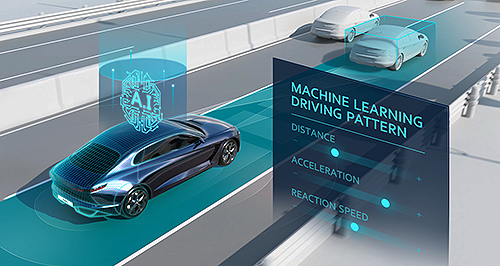Make / Model Search
News - HyundaiHyundai brings AI to adaptive cruise controlMachine Learning-based Smart Cruise Control on the horizon thanks to Hyundai22 Oct 2019 HYUNDAI Motor Group looks to have solved some of the issues currently facing adaptive cruise control (ACC) systems by adding artificial intelligence (AI) that learns the driver’s habits and adopts them as the vehicle’s own.
Dubbed Machine Learning-based Smart Cruise Control (SCC-ML), the evolved advanced driver-assist system (ADAS) uses the front camera and radar to monitor the distance from the vehicle in front, the level of acceleration and how quickly the driving conditions are responded to, all of which are variables that are traditionally controlled by the driver.
This data is constantly sent to the vehicle’s centralised computer that then identifies the individual’s driving style using more than 10,000 patterns, ultimately adapting its behaviour to suit via machine learning.
Comparatively, regular ACC systems are activated when the driver sets a specific speed and a following distance (usually one of three intervals), after which the vehicle autonomously controls acceleration and braking.
However, the manner in which these ACC systems then behave is a source of frustration for many drivers as they either accelerate too slowly or brake too early or harshly, leading to the active safety technology being switched off in many cases.
The South Korean company tends to agree, arguing that “it was impossible to meticulously fine-tune the settings to accommodate the driver’s individual preferences without machine-learning technology”.
It further notes that “even the same driver may accelerate differently in high-speed, mid-speed and low-speed environments, depending on circumstance”, meaning regular ACC systems are unlikely to please even the most nonchalant of drivers.
For example, SCC-ML is able to maintain a short following distance from the vehicle in front in slow city traffic but can be further away when driving in the fast lane. Existing ACC systems do either one or the other.
As such, SCC-ML promises on paper to produce a much smoother and therefore less frustrating driving experience – one that is recognised by the Society of Automotive Engineers (SAE) as Level 2.5 self-driving when active lane-change assist is factored in.
SCC-ML’s logic is also regularly updated using the vehicle’s sensors so that the individual’s latest driving style is reflected. That said, it is specifically programmed to avoid learning unsafe patterns, which therefore increases its reliability and safety.
“The new SCC-ML improves upon the intelligence of the previous ADAS technology to dramatically improve the practicality of semi-autonomous features,” said Hyundai Motor Group vice-president Woongjun Jang.
“Hyundai Motor Group will continue the development efforts on innovative AI technologies to lead the industry in the field of autonomous driving.”
The company claims SCC-ML is a world-first technology, adding that it will be introduced in future Hyundai, Kia and Genesis production models.  Read more18th of September 2019  Hyundai commits to centre airbagNew centre airbag from Hyundai helps to protect front-seat occupants from head clash26th of July 2019  Hyundai innovates with Sonata HybridSonata Hybrid under review for Australia as Hyundai gets innovative with new model |
Click to shareHyundai articlesResearch Hyundai Motor industry news |











Facebook Twitter Instagram